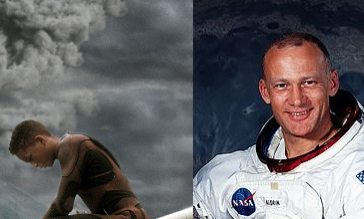Buzz Aldrin Nitpicks 'After Earth' Scientific Mistake: In Space, No One Can Hear An Explosion

Astronaut Buzz Aldrin took a break from his regular schedule of punching moon landing deniers to offer his critique of M. Night Shyamalan’s latest dud, “After Earth.” Unlike other reviewers, Aldrin’s problem with the movie wasn’t so much with the acting, writing or directing; his nitpicking was purely scientific.
"There was a lot of noise,” the 83-year-old NASA astronaut said, according to USA Today. “In space, you don't get that much noise."
Lots of science-fiction movies punch up space-battle scenes with noisy explosions, but if you were actually floating outside those ships, the destruction would seem totally silent. Sound doesn’t travel through space, because space is airless. When you hear someone talking, what your ear is receiving is the vibrations of air (or water) molecules between you and the source of the noise.
Radio waves do travel through space, and numerous celestial objects emit radio signals. NASA has actually collected spooky sounds near Jupiter and its moon Ganymede, and scientists have known for decades that the center of our Milky Way galaxy emits a steady, hissing static. We can capture these celestial radio waves, but we then need technology to translate those signals into sound. (That limitation is a good thing -- imagine if you could hear every radio station playing at once!) Radio waves are detected with an antenna, and a sound wave can be extracted with a demodulator, then sent to speakers courtesy of an amplifier.
There may be certain places where a free-floating astronaut could hear a sound. Remember that sound waves require some kind of matter to propagate, and it can be almost any type of matter. For instance, there are sound waves passing through the gaseous interior of our sun -- there’s a whole branch devoted to studying these waves, called helioseismology. (We can’t actually hear these sound waves, thanks to the 93 million miles of vacuum between Earth and the sun).
Out in space, there are some interstellar gas clouds that could provide a medium for sound waves to propagate. But those clouds of gas are often extremely thin -- just a few atoms per cubic foot. It would take a terrifically sensitive instrument to detect those diffuse vibrations. There could be areas of denser, colder space gas, such as in a nebula, that could provide a little more opportunity for sound waves to travel.
So if gases can transmit sound waves, couldn’t an exploding spaceship make a noise that travels along with the gases emitted by the explosion? Not likely, according to Cornell astronomer Lynn Carter.
“The exploding ship would release gases, and technically sound could travel along with them. However, since space is a vacuum, these gases will spread out very rapidly, and the density will drop off very fast with distance from the explosion,” Carter wrote in 1999. “So by the time the explosion reached your ship nearby, any sounds carried by the gas would still be too faint to hear.”
It seems that “Alien” really did get it right: In space, no one can hear you scream (or explode).
© Copyright IBTimes 2024. All rights reserved.





















